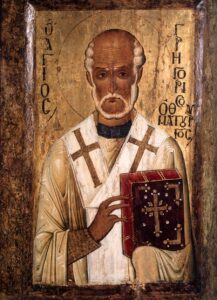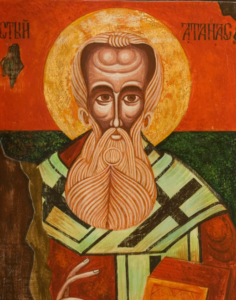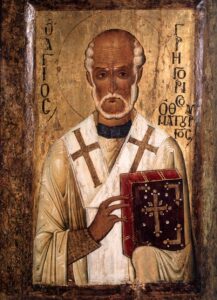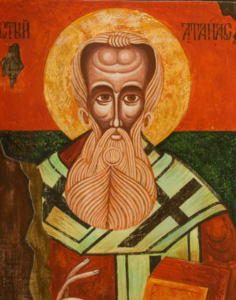|
|
Guest Writer
The influence of Africa on Christianity is profound and often overlooked. To understand this, we need to delve into the early history.
Christianity was born in the eastern Mediterranean region, in what is today Israel and Palestine. From there, it spread rapidly across the Roman Empire, reaching Africa early on. North Africa, in particular, was a significant center for Christian thought and practice. Alexandria, in modern-day Egypt, was a major center of Christian scholarship, and influential thinkers like Origen of Alexander and Athanasius lived and wrote there.
Origen was born in the city of Alexandria, Egypt, around 185 AD. His parents were Christian, and his father was killed during the persecution of Christians under the Roman Emperor Septimius Severus. This event, along with his mother’s dedication to the faith, strongly influenced Origen’s religious beliefs and shaped his future.

Origen was known for his incredible intellect and dedication to scholarship, studying under the philosopher Ammonius Saccas and later becoming a teacher of Christian theology and philosophy himself. He was a prolific writer, producing numerous works on theology, biblical commentary, and philosophy. One of Origen’s most significant contributions to Christianity was his systematization of Christian doctrine. He is often credited with introducing the allegorical interpretation of scripture, which became a standard approach in Christian theology.

Origen’s influence extended far beyond his lifetime. His ideas shaped the development of Christian theology and the understanding of scripture, and his work laid the foundation for the emergence of systematic theology in the Christian tradition. Origen’s legacy as a Christian scholar, theologian, and philosopher endures to this day, and his works continue to be studied and debated by scholars and theologians around the world.
St. Athanasius, also known Africa’s Influence on Christianity is profound, often overlooked as Athanasius of Alexandria, was one of the most prominent figures in early Christian history and theology. Born around 296 AD in Alexandria, Egypt, he became the Bishop of Alexandria and played a Continued on page 9 significant role in shaping Christian doctrine, particularly during the fourth-century Arian controversy.
The Arian controversy was a theological dispute centered around the nature of Jesus Christ. Arius, a Christian presbyter from Alexandria, taught that Jesus, as the Son of God, was a created being and therefore not equal to the Father in substance or essence. Athanasius vehemently opposed this view and argued that Jesus was of the same substance (homoousios) as the Father, an idea that eventually became the foundation of orthodox Trinitarian doctrine.
Athanasius’ commitment to this belief led to his exile from Alexandria multiple times by various Roman emperors who held Arian sympathies. Despite these challenges, he continued to defend the Nicene Creed and the orthodox understanding of the Trinity, making significant contributions to the development of Christian theology.
In addition to his theological writings, Athanasius is also remembered for his role in the canonization of the New Testament. In his Festal Letter of 367 AD, he listed the 27 books of the New Testament that are recognized by most Christian denominations today.Athanasius is revered as a saint in many Christian traditions, and his legacy continues to influence Christian theology and thought. He is often referred to as “the father of Orthodoxy” for his unwavering defense of orthodox Christian doctrine in the face of opposition and persecution.
The Coptic Orthodox Church in Egypt traces its roots to St. Mark, who is believed to have brought Christianity to Egypt in the first century. The Ethiopian Orthodox Tewahedo Church also has ancient origins, dating back to the fourth century. It is worth noting that Ethiopia is the only African nation to have never been colonized, and its Christian tradition is deeply rooted in its cultural identity.
Moreover, Africa played a critical role in the early church councils, which helped shape Christian doctrine. The Council of Nicaea in 325 AD, for example, was attended by bishops from across the Roman Empire, including Africa.
It is also important to recognize that the African Christian tradition has been distinct from its European counterpart. Christianity in Africa often incorporates indigenous cultural practices and beliefs. This can be seen in the vibrant liturgical music and dance of African churches or the practice of ancestor veneration, which some African Christians see as compatible with their faith.
The spread of Christianity in Africa was not solely the result of European missionaries. In fact, long before European colonization, African Christians were evangelizing their own communities. The expansion of Christianity in Africa is a complex and multifaceted story, influenced by indigenous traditions, African Christian leaders, and European missionaries.
Overall, the history of Christianity in Africa is a testament to the diversity and adaptability of the Christian faith. It shows how a religion that originated in the Middle East was able to take root and flourish in Africa, contributing to the rich tapestry of global Christianity.
Staff Writer
The influence of Africa on Christianity is profound and often overlooked. To understand this, we need to delve into the early history of Christianity.
Christianity was born in the eastern Mediterranean region, in what is today Israel/Palestine. From there, it spread rapidly across the Roman Empire, reaching Africa early on. North Africa, in particular, was a significant center for Christian thought and practice. Alexandria, in modern-day Egypt, was a major center of Christian scholarship, and influential thinkers like Origen and Athanasius lived and wrote there.

Origen was born in the city of Alexandria, Egypt, around 185 AD. His parents were Christian, and his father was killed during the persecution of Christians under the Roman Emperor Septimius Severus. This event, along with his mother’s dedication to the faith, strongly influenced Origen’s religious beliefs and shaped his future.
Origen was known for his incredible intellect and dedication to scholarship, studying under the philosopher Ammonius Saccas and later becoming a teacher of Christian theology and philosophy himself. He was a prolific writer, producing numerous works on theology, biblical commentary, and philosophy.One of Origen’s most significant contributions to Christianity was his systematization of Christian doctrine. He is often credited with introducing the allegorical interpretation of scripture, which became a standard approach in Christian theology.
Origen’s influence extended far beyond his lifetime. His ideas shaped the development of Christian theology and the understanding of scripture, and his work laid the foundation for the emergence of systematic theology in the Christian tradition.Origen’s legacy as a Christian scholar, theologian, and philosopher endures to this day, and his works continue to be studied and debated by scholars and theologians around the world.

St. Athanasius, also known as Athanasius of Alexandria, was one of the most prominent figures in early Christian history and theology. Born around 296 AD in Alexandria, Egypt, he became the bishop of Alexandria and played a significant role in shaping Christian doctrine, particularly during the fourth-century Arian controversy.
The Arian controversy was a theological dispute centered around the nature of Jesus Christ. Arius, a Christian presbyter from Alexandria, taught that Jesus, as the Son of God, was a created being and therefore not equal to the Father in substance or essence. Athanasius vehemently opposed this view and argued that Jesus was of the same substance (homoousios) as the Father, an idea that eventually became the foundation of orthodox Trinitarian doctrine.
Athanasius’ commitment to this belief led to his exile from Alexandria multiple times by various Roman emperors who held Arian sympathies. Despite these challenges, he continued to defend the Nicene Creed and the orthodox understanding of the Trinity, making significant contributions to the development of Christian theology.
In addition to his theological writings, Athanasius is also remembered for his role in the canonization of the New Testament. In his Festal Letter of 367 AD, he listed the 27 books of the New Testament that are recognized by most Christian denominations today.Athanasius is revered as a saint in many Christian traditions, and his legacy continues to influence Christian theology and thought. He is often referred to as “the father of Orthodoxy” for his unwavering defense of orthodox Christian doctrine in the face of opposition and persecution.
The Coptic Orthodox Church in Egypt traces its roots to St. Mark, who is believed to have brought Christianity to Egypt in the first century. The Ethiopian Orthodox Tewahedo Church also has ancient origins, dating back to the fourth century. It is worth noting that Ethiopia is the only African nation to have never been colonized, and its Christian tradition is deeply rooted in its cultural identity.
Moreover, Africa played a critical role in the early church councils, which helped shape Christian doctrine. The Council of Nicaea in 325 CE, for example, was attended by bishops from across the Roman Empire, including Africa.
It is also important to recognize that the African Christian tradition has been distinct from its European counterpart. Christianity in Africa often incorporates indigenous cultural practices and beliefs. This can be seen in the vibrant liturgical music and dance of African churches or the practice of ancestor veneration, which some African Christians see as compatible with their faith.
The spread of Christianity in Africa was not solely the result of European missionaries. In fact, long before European colonization, African Christians were evangelizing their own communities. The expansion of Christianity in Africa is a complex and multi-faceted story, influenced by indigenous traditions, African Christian leaders, and European missionaries.
Overall, the history of Christianity in Africa is a testament to the diversity and adaptability of the Christian faith. It shows how a religion that originated in the Middle East was able to take root and flourish in Africa, contributing to the rich tapestry of global Christianity





